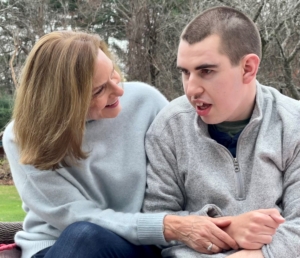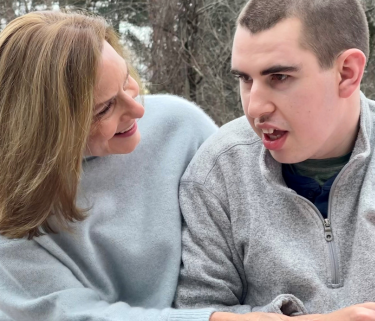Barbara Advocates for Her Son Jake Because His Life Depends on It
 Barbara’s son Jake is a medically complex young adult living at home with his parents. Jake relies on Medicaid to provide the services he needs to be medically safe and supported at home, including continuous skilled nursing and personal care assistance (PCA).
Barbara’s son Jake is a medically complex young adult living at home with his parents. Jake relies on Medicaid to provide the services he needs to be medically safe and supported at home, including continuous skilled nursing and personal care assistance (PCA).
To be eligible for these services, Jake undergoes an annual assessment. This determines the number of support hours that are medically necessary for him to live safely at home and not in an institutional setting. Living in the comfort of his own home—and getting his medical, social, emotional, and recreational needs met, surrounded by loved ones—is important to Jake and a top priority for his family.
When Jake receives the support he requires, it is also of significant benefit to the state, since providing support for medically complex individuals at home is far less costly than residential or institutional placements. When the system works as it is intended to, everyone wins.
Currently, Jake is authorized to receive over 50 hours of continuous skilled nursing and over 70 hours of PCA services per week. The problem is there is a significant shortage of home-based nurses and caregivers for individuals like Jake, so only a small percentage of his authorized hours are staffed.
For several years, less than 10% of Jake’s nursing hours and less than half of his PCA hours have been filled. It is not uncommon for Jake’s parents to go days or weeks without help.
So, what happens when families can’t find appropriately trained staff and states can’t meet the mandate of filling authorized hours with reasonable promptness?
For Jake’s parents and for other families caring for medically complex pediatric and adult children living at home, it means the burden of care typically defaults to family members, putting an immense strain on families.
For Barbara and her son, the toll is significant. In Barbara’s words:
“I am Jake’s mother and guardian but, by necessity, I am also a full-time caregiver, routinely performing the duties of a nurse, personal care assistant, and home health aide. Having my son at home is not a burden, but providing the care he needs without the help that he is due is taxing at best and unsustainable and dangerous at worst.
I am typically ‘on duty’ 24/7, providing clinical care without any qualification or expertise other than lived experience. The relentless task of providing full-time care results in chronic sleep deprivation, exhaustion, and isolation. There are no days off. If I am not directly providing care, I am managing the endless list of duties that support our fragile infrastructure: recruiting help, managing prescriptions, ordering medical equipment and supplies, making and attending medical appointments, ensuring assessments and care plans are up to date, and working with multiple agencies and providers.
The low rate of pay offered to nurses and other homecare providers offers little incentive to pursue these jobs and is not competitive with less-taxing, higher-paying positions. Not being able to offer attractive, competitive pay commensurate with the expected level of skilled care that needs to be provided forces families to hire less qualified help out of desperation. This puts the lives of our children at risk. We should not be forced to lower the bar at our loved one’s expense.
Not having skilled care providers in our home means more frequent and costly ambulance calls, emergency room visits, and hospitalizations. It also means that parents routinely need to make critical, ‘in the moment’, medical decisions without direct guidance or support from trained clinicians who know their child well. Making the wrong decision could mean the difference between life and death. Imagine, living with the burden of that responsibility. [Jake’s] life is in my hands, every single day.”
The occurrence of a global pandemic exacerbated a chronic nursing shortage. It also shed a greater spotlight on the unique challenges faced by parents who care for medically fragile children at home. While the pandemic has wound down for many, for families like Barbara’s, the parameters under which it forced us all to live will continue. The challenges she faces of keeping her son safe, home, and alive remain a daily struggle, and the shortage of qualified caregivers persists. These families are in crisis, and they need help.
Barbara hopes that sharing her story will encourage other families to do the same. “Advocacy starts with creating awareness. Through telling our stories, we find and build community. Through community, we build strength and increase the power of our advocacy. At all levels, we are facing a crisis and our voices need to be heard and acknowledged. As a country, we can and must do better. Our children’s lives depend on it.”








